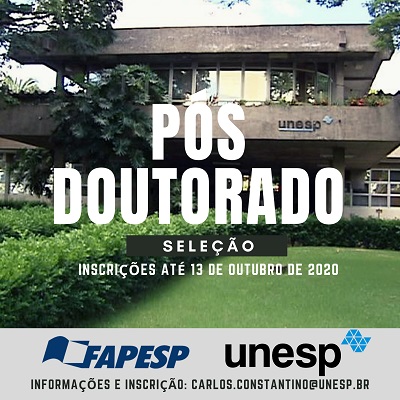 *Opportunity: the Laboratory of Nanostructured Materials for Environmental and Biological Analyses invites applications for a post-doctoral research fellowship funded by São Paulo Research Foundation (FAPESP: https://www.fapesp.br/en). This fellowship is linked to the Thematic Project “Toward a convergence of technologies: from sensing and biosensing to information visualization and machine learning for data analysis in clinical diagnosis” (FAPESP process number: 2018/22214-6).
*Opportunity: the Laboratory of Nanostructured Materials for Environmental and Biological Analyses invites applications for a post-doctoral research fellowship funded by São Paulo Research Foundation (FAPESP: https://www.fapesp.br/en). This fellowship is linked to the Thematic Project “Toward a convergence of technologies: from sensing and biosensing to information visualization and machine learning for data analysis in clinical diagnosis” (FAPESP process number: 2018/22214-6).
*Supervisor: Carlos José Leopoldo Constantino (full professor).
*Institution: Department of Physics, São Paulo State University (UNESP), campus in the city of Presidente Prudente, São Paulo State, Brazil (https://www.international.unesp.br/).
*Fellowship components: it includes a monthly stipend (R$ 7,373.10) and research contingency funds (15 per cent of the annual value of the fellowship for using in activities developed by the Fellowship holder, strictly related to the fellowship research project).
*Duration of the post-doctoral fellowship: up to 48 months (starting: December/01/2020 or as soon as possible; ending: up to February/28/2025).
*More info/fellowship: https://www.fapesp.br/en/postdoc
*Candidate requirements: she or he should have concluded the Ph.D. less than seven years before the beginning of the post-doctoral fellowship. Applicants must have a Ph.D. in physics, chemistry, materials science or related fields. The successful candidate must have excellent communication skills and excel in a highly collaborative research environment. In addition to the timely publication of research results in peer-reviewed journals, the responsibilities of the post-doctoral include drafting progress reports. The successful candidate will conduct research on: Detection of pesticides using surface-enhanced Raman scattering (SERS) spectroscopy. Therefore, this research includes experimental activities using techniques such as:
(i) Synthesis of colloid of metallic nanoparticles applied as “SERS substrate”.
(ii) Characterizations of the “SERS substrates” through microscopy, UV-Vis extinction spectroscopy, zeta potential, and dynamic light scattering (DLS).
(iii) Micro-Raman and surface-enhanced Raman scattering (SERS) spectroscopies.
(iv) Computational methods for data analysis.
*Deadline for application: October/13/2020.
*Application: interested individuals should send to carlos.constantino@unesp.br the following documents:
(i) CV with the list of publications.
(ii) Two letters of recommendation.
(iii) Work plan: 4-pages maximum with title, justification, objectives, and methodology.
Available facilities (basic):
https://www.fct.unesp.br/#!/departamentos/fisica-quimica-e-biologia/laboratorios/
